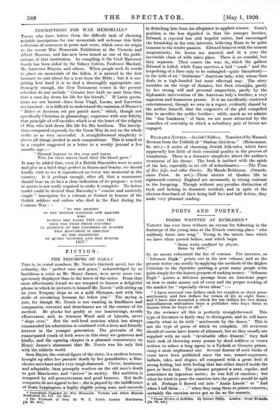FICTION.
THE TRIUMPHS OF SARA.-1- THIS is, in round numbers, Mr. NOITiS'S thirtieth novel, but the urbanity, the "perfect ease and grace," acknowledged by so fastidious a critic as Mr. Henry James, were never more con- spicuously displayed than in the latest of the series. From that same affectionate friend we are tempted to borrow a delightful phrase in which he pictures to himself Mr. Norris "still sitting up on your Torquay slope as on a mild Olympus, and with this strife of circulating humans far below you." The saying is just, for though Mr. Norris is not wanting in kindliness and compassion, restraint and detachment are of the essence of his method. He plucks but gently at our, heartstrings, avoids effusiveness, and, as Artemus Ward said of Lincoln, never "slops over." But the well-bred stoicism which has always commanded his admiration is combined with a keen and friendly interest in the younger generation. The portraits of the emancipated youth of both sexes in this story are generous and kindly, and the opening chapter is a pleasant commentary on Henry James's statement that Mr. Norris was his only link with the athletic world.
Sara Hayes, the central figure of the story, is a modern heiress, brought up after her parents' death by her grandfather, a Man- chester merchant and a very rough diamond. Clever, handsome, and adaptable, Sara promptly resolves on the old man's death to quit Manchester and "arrive" in society. Her ambition is tempered by self-protectiveness and good humour. But facile conquests do not appeal to her : she is piqued by the indifference of Euan Leppington, a highly eligible young man, and succeeds
• Inscriptions Attegated for War Memorials. Victoria and Albert Museum Publication No. 113. [is. bet.] t 214s Triomphe of Sara. By W. E. Norris. Loudon Hutchinson. Od. net.] in detaching him from his allegiance to applied science. Euan's position is the less dignified in that his younger brother, Edward, a rejected but still hopeful suitor, had encouraged the friendship in his own interests, believing Euan to be quite immune to the tender passion. Edward behaves with the utmost magnanimity, the lovers are married, and in a year the inevitable clash of wills takes place. There is no scandal, but they separate. Then cornea the war, in which the gallant Edward is killed, while Euan survives a bad " crash " and the torpedoing of a liner only to be entangled—quite blamelessly— in the toils of an " Italianate " American lady, with whom Sara deals in a high-handed but most effectual way. The story trembles on the verge of disaster, but Sara triumiths, partly by her strong will and personal magnetism, partly by the diplomatic intervention of the American lady's brother, a very sagacious and humorous person. It is an excellently contrived entertainment, though we own to a regret, evidently shared by the author himself, that the exigencies of the plot compelled him to sacrifice the nobler brother ; while, much as we admire the "fine frankness" of Sara, we are more attracted by the comedies of courtship in which a subsidiary pair of lovers are engaged.


































 Previous page
Previous page